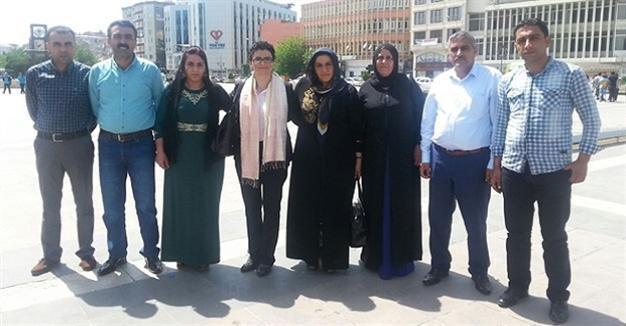Court fines state to pay around 550,000 liras to family of 1980 coup prisoner victim
DİYARBAKIR
 A local court in Turkey’s southeastern province of Diyarbakır has fined the Ministry of Defense a total of 548,000 Turkish Liras for pecuniary and non-pecuniary damages to a victim, who died in custody allegedly due to torture.
A local court in Turkey’s southeastern province of Diyarbakır has fined the Ministry of Defense a total of 548,000 Turkish Liras for pecuniary and non-pecuniary damages to a victim, who died in custody allegedly due to torture.The Ministry of Defense was fined by Diyarbakır’s 2nd Administrative Court to pay 68,000 liras for pecuniary damage and 480,000 liras for non-pecuniary damage to the eight children of Seyfettin Sak, who died imprisoned in 1982, during the government formed after the 1980 military coup, on grounds of the state being responsible for the individuals’ right to life in prison and for providing a plausible reason in case of death. The court decision stated that the state could not provide a plausible explanation because no autopsy was conducted on Sak’s body. Instead, coronary and renal failure and high blood pressure were listed as cause of death, and the prosecutor’s office then closed the case into Sak’s death without further investigation.
Sak was detained in May 1982, on grounds of allegedly bribing to save his son, who was under arrest due to political reasons during the 1980 coup era. Sak was allegedly tortured for 45 days and then sent to the Diyarbakır 5th Military Jail, where he died on Nov. 21, 1982.
Because the prosecutor had closed the case on Sak’s death, his family could not appeal the cause of death, until after the referendum on Sept. 12, 2010, which lifted a temporary article in the law that had banned the prosecution of people responsible for the Sept. 12, 1980 coup.
The eight children of Sak made a denunciation of their father’s death in 2012 via their lawyer Rojbin Tuğan Kalkan but because the prosecutor’s office did not take the denunciation seriously and conduct a thorough investigation, the family decided to sue the Ministry of Defense for compensation.
The Diyarbakır local court rejected the ministry’s defense that the case could not be opened due to time passed. Meanwhile, the court defended the family’s right to sue by stating that they had not had the chance to go to court due to the temporary article, but, as that clause was lifted two years ago, they now had the right to proceed with the court case.
The court stated in its decision that according to constitution article 17, the state had the responsibility to preserve the individuals’ material and non-material entity. The court also referred to a decision from the European Court of Human Rights (ECHR), while restates the European Convention on Human Rights’ third article that forbids torture.
In light of these laws and prior decisions and despite the lack of open evidence that Sak had been subject to torture, the Diyarbakır court ruled for on the side of Sak’s family, as the state is responsible for individuals under its custody. Furthermore, in the case of a prisoner’s death under custody, the state would be obligated to present a plausible reason that individual’s worsening health conditions and subsequent death, especially if the prisoner was healthy when first taken under custody.
Thirty-three years after their father died, the eight children of Sak have convicted the state.
















